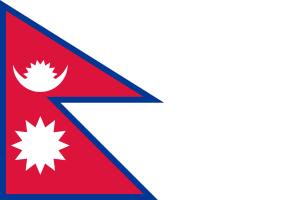Difference between revisions of "Language/Nepali-individual-language/Grammar/Nouns"
m (Quick edit) |
m (Quick edit) |
||
| Line 51: | Line 51: | ||
<hr>If you have any questions, please ask them in the comments section below.<br>Feel free to edit this wiki page if you think it can be improved. 😎 | <hr>If you have any questions, please ask them in the comments section below.<br>Feel free to edit this wiki page if you think it can be improved. 😎 | ||
==Related Lessons== | |||
* [[Language/Nepali-individual-language/Grammar/Gender|Gender]] | |||
* [[Language/Nepali-individual-language/Grammar/Verbs-kriyaharu-क्रियाहरू|Verbs kriyaharu क्रियाहरू]] | |||
* [[Language/Nepali-individual-language/Grammar/Future-Tense|Future Tense]] | |||
* [[Language/Nepali-individual-language/Grammar/Pronouns|Pronouns]] | |||
* [[Language/Nepali-individual-language/Grammar/Questions|Questions]] | |||
* [[Language/Nepali-individual-language/Grammar/Adjectives|Adjectives]] | |||
* [[Language/Nepali-individual-language/Grammar/Conditional-Mood|Conditional Mood]] | |||
* [[Language/Nepali-individual-language/Grammar/Negation|Negation]] | |||
{{Nepali-individual-language-Page-Bottom}} | {{Nepali-individual-language-Page-Bottom}} | ||
Revision as of 23:05, 25 February 2023
Hi Nepali (individual language) learners! 😊
In today's lesson, we will be discussing the basics of Nepali (individual language) nouns. Nouns are an essential part of any language, and understanding them is key to mastering the language. We will look at the different types of nouns, how they are formed, and how they are used in sentences.
Types of Nouns
Nouns can be divided into two main categories: common nouns and proper nouns. Common nouns refer to general things, such as people, places, animals, and objects. Proper nouns refer to specific people, places, animals, and objects.
Common Nouns
Common nouns are words that refer to general things. Examples of common nouns include: person, place, animal, object.
Proper Nouns
Proper nouns are words that refer to specific people, places, animals, and objects. Examples of proper nouns include: John, London, Tiger, iPhone.
Formation of Nouns
Nouns can be formed in a variety of ways. They can be formed from verbs, adjectives, and other nouns.
Verbs
Nouns can be formed from verbs by adding suffixes. For example, the verb "run" can be turned into the noun "runner" by adding the suffix "-er".
Adjectives
Nouns can also be formed from adjectives by adding suffixes. For example, the adjective "happy" can be turned into the noun "happiness" by adding the suffix "-ness".
Other Nouns
Nouns can also be formed from other nouns by adding prefixes or suffixes. For example, the noun "teacher" can be turned into the noun "teaching" by adding the suffix "-ing".
Usage of Nouns
Nouns are used in a variety of ways in sentences. They can be used as the subject of a sentence, the object of a sentence, or as a modifier.
Subject
The subject of a sentence is the noun that performs the action. For example, in the sentence "John runs", "John" is the subject.
Object
The object of a sentence is the noun that receives the action. For example, in the sentence "John runs to the store", "store" is the object.
Modifier
Nouns can also be used as modifiers. Modifiers are words that modify or describe other words. For example, in the sentence "John runs to the grocery store", "grocery" is a modifier that describes the noun "store".
If you have any questions, please ask them in the comments section below.
Feel free to edit this wiki page if you think it can be improved. 😎
Related Lessons
- Gender
- Verbs kriyaharu क्रियाहरू
- Future Tense
- Pronouns
- Questions
- Adjectives
- Conditional Mood
- Negation
